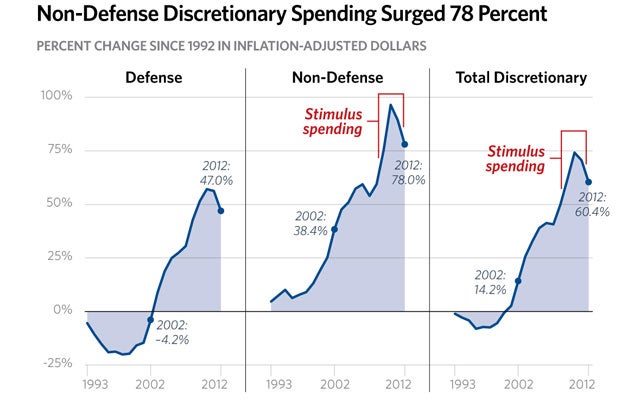Senator Mary Landrieu (D–LA) recently stated, “I am not going to keep cutting the discretionary budget, which by the way is not out of control, despite what you hear on Fox News.” I got to join Fox News’s Eric Bolling in a segment of “Your World with Neil Cavuto” to set the record straight.
From the Environmental Protection Agency awarding a $140,000 grant to study Chinese swine manure to the National Institutes of Health funding studies on the hookah smoking habits of Jordanian students to the Department of Agriculture funding a $20 million reality TV show in India to promote U.S. cotton to a country that is a net exporter of cotton, government waste in the discretionary budget abounds.
But that’s just the tip of a massive iceberg of federal spending. Spending on entitlements is the main driver of the accelerating U.S. spending and debt crisis. By 2025, Social Security, Medicare, Medicaid, Obamacare, and net interest costs will consume all projected tax revenues.
Non-defense discretionary spending surged 78 percent in inflation-adjusted dollars over the past two decades as the federal government has usurped more and more power from state governments and Washington’s bureaucracy has grown far beyond reasonable bounds.
Federal spending is currently at about 23 percent of gross domestic product (GDP)—way above the historical average of 20.2 percent. Unless Congress puts the brakes on spending, it will surge to nearly 36 percent in less than one generation.
Congress is in the middle of the budget process, and this could be one of the few remaining opportunities to control spending and debt in a prudent and gradual manner.
If Congress and the President keep ignoring the problem, they risk a fiscal and economic crisis, which would force drastic policy measures with significant harm to the American people. Congress should instead strive to balance the budget within the 10-year budget window by scaling back federal spending in nearly all areas to meet tax revenues at 18.5 percent of GDP.
Heritage’s plan, Saving the American Dream, shows that the responsible course of action—balancing the budget in 10 years without burdening Americans with crippling taxes or compromising the nation’s national security—is possible.






























